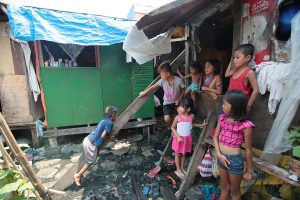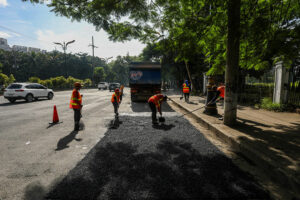THE Department of Environment and Natural Resources (DENR) and the United Nations Children’s Fund (UNICEF) urged the government, private sector, and communities to put children at the center of climate action.
They issued the call to accompany the launch of a report which found that Filipino children face some of the most severe climate-related risks in the world.
The two organizations called for higher investment in climate-resilient social services, and stronger child and youth participation in decisions on climate and the environment.
“As stewards of our nation’s environment and natural resources, we recognize the urgent need to address the escalating impacts of climate change, particularly on the most vulnerable segment of our society: our children,” Environment Secretary Raphael P.M. Lotilla said in a statement.
According to the 2025 Climate Landscape Analysis for Children, the Philippine score on the UNICEF Children’s Climate Risk Index was 8.9 out of 10, the sixth highest in the world.
“Over 97% of children in the country are exposed to three or more climate-related shocks — some of the world’s highest risks from climate change. These hazards threaten not only their survival but also their rights to health, education, water, sanitation, protection and a safe environment,” the report found.
It warned that more frequent extreme weather events are driving school closures, disease outbreaks, food insecurity and heightened risks of exploitation, especially for girls, indigenous children, those with disabilities and those living in poverty.
UNICEF Representative to the Philippines Kyungsun Kim said the high level of climate risk demands urgent, child-focused action.
“We must scale up investment in adaptation, particularly in the basic services children rely on to survive and thrive, namely health, nutrition, education, water and sanitation, and protection,” she said at an event to launch the new report.
UNICEF said this means climate-proofing healthcare facilities, making schools safe from extreme heat and disasters, safeguarding water systems, and expanding social protection for families affected by climate shocks.
The report also said children are not only victims of the climate crisis but also “powerful agents of change” whose participation must be institutionalized and mainstreamed in climate policies and programs.
Behzad Noubary, deputy representative for programs at UNICEF Philippines, told reporters on the sidelines of the event that while there are many promising youth-led and community initiatives on climate action, these efforts are not yet being scaled up.
“We have these islands of success, where people from the grassroots are doing some great things, but we need to make sure that that spreads throughout the country. I think the young people in the Philippines are leading the way when it comes to solutions,” he said.
UNICEF said it is optimistic that the results of the report can be used to guide the country’s climate programs.
“We have a bit of a commitment there. The national adaptation plan now needs to be localized. In that localization process, the Children’s Climate Risk Index can be a source of information about the children in different localities in the Philippines,” Mr. Noubary said. — Vonn Andrei E. Villamiel






